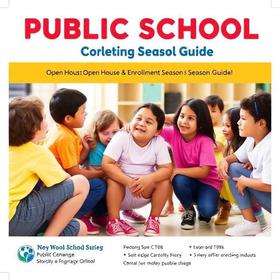Serving 549 students in grades 6-8, Brown Barge Middle School ranks in the top 5% of all schools in Florida for overall test scores (math proficiency is top 5%, and reading proficiency is top 5%).
The percentage of students achieving proficiency in math is 83% (which is higher than the Florida state average of 52%). The percentage of students achieving proficiency in reading/language arts is 81% (which is higher than the Florida state average of 52%).
The student-teacher ratio of 25:1 is higher than the Florida state level of 17:1.
Minority enrollment is 44% of the student body (majority Black), which is lower than the Florida state average of 65% (majority Hispanic).
Quick Facts (2025-26)
- School Type: Magnet School
- Grades: 6-8
- Enrollment: 549 students
- Student-Teacher Ratio: 25:1
- Minority Enrollment: 44%
- Overall Testing Rank: Top 5% in FL
- Math Proficiency: 83% (Top 5%)
- Reading Proficiency: 81% (Top 5%)
- Science Proficiency: 60-64% (Top 30%)
- Source: National Center for Education Statistics (NCES), FL Dept. of Education
Top Rankings
Brown Barge Middle School ranks among the top 20% of public schools in Florida for:
Category
Attribute
Overall Rank
Math Proficiency
Reading/Language Arts Proficiency
School Overview
Brown Barge Middle School's student population of 549 students has stayed relatively flat over five school years.
The teacher population of 22 teachers has declined by 21% over five school years.
School Type
Grades Offered
Grades 6-8
(No virtual instruction)
(No virtual instruction)
Total Students
549 students
Gender %
Total Classroom Teachers
22 teachers
School Calendar
School Rankings
Brown Barge Middle School ranks within the top 5% of all 3,662 schools in Florida (based off of combined math and reading proficiency testing data).
The diversity score of Brown Barge Middle School is 0.64, which is less than the diversity score at state average of 0.70. The school's diversity has stayed relatively flat over five school years.
Overall Testing Rank
#147 out of 3662 schools
(Top 5%)
(Top 5%)
Math Test Scores (% Proficient)
83%
52%
Reading/Language Arts Test Scores (% Proficient)
81%
52%
Science Test Scores (% Proficient)
60-64%
52%
Student-Teacher Ratio
25:1
17:1
American Indian
n/a
n/a
Asian
6%
3%
Hispanic
9%
37%
Black
16%
21%
White
56%
35%
Hawaiian
1%
n/a
Two or more races
12%
4%
All Ethnic Groups
Participates in the National School Lunch Program (NSLP)
Yes
Eligible for Free Lunch
29%
47%
Eligible for Reduced Lunch
7%
4%
School Statewide Testing
School District Name
Source: National Center for Education Statistics (NCES), FL Dept. of Education
Profile last updated: 02/09/2025
Frequently Asked Questions
What is Brown Barge Middle School's ranking?
Brown Barge Middle School is ranked #147 out of 3,662 schools, which ranks it among the top 5% of public schools in Florida.
What schools are Brown Barge Middle School often compared to?
Brown Barge Middle Schoolis often viewed alongside schools like Beulah Academy Of Science, J. H. Workman Middle School by visitors of our site.
What percent of students have achieved state testing proficiency in math and reading?
83% of students have achieved math proficiency (compared to the 52% FL state average), while 81% of students have achieved reading proficiency (compared to the 52% FL state average).
How many students attend Brown Barge Middle School?
549 students attend Brown Barge Middle School.
What is the racial composition of the student body?
56% of Brown Barge Middle School students are White, 16% of students are Black, 12% of students are Two or more races, 9% of students are Hispanic, 6% of students are Asian, and 1% of students are Hawaiian.
What is the student-teacher ratio of Brown Barge Middle School?
Brown Barge Middle School has a student ration of 25:1, which is higher than the Florida state average of 17:1.
What grades does Brown Barge Middle School offer ?
Brown Barge Middle School offers enrollment in grades 6-8 (No virtual instruction).
What school district is Brown Barge Middle School part of?
Brown Barge Middle School is part of Escambia School District.
In what neighborhood is Brown Barge Middle School located?
Brown Barge Middle School is located in the North Central Pensacola neighborhood of Pensacola, FL. There are 4 other public schools located in North Central Pensacola.
School Reviews
2 10/10/2025
Very unfair school. They don't care nothing about you student, at all. If your child is left behind, the teachers don't care. All they care about is their paycheck.
5 10/10/2025
Great school, if you're willing to keep up. Lots of work, but you get opportunities and get to do fun things at this school you won't get at many schools. for example,t the renaissance fair, walk for impact, special field trips, etc.
5 10/10/2025
very good school, highly recommend.
5 10/10/2025
I have went here for all of my middle school career and have NEVER SEEN A THIRD GRADER. Nice school, but the lunch tastes bad. Got some cool kids, but the band is really small. This hjuh person must be a robot, because teachers do care a lot about you students and love helping us learn.
Review Brown Barge Middle School. Reviews should be a few sentences in length. Please include any comments on:
- Quality of academic programs, teachers, and facilities
- Availability of music, art, sports and other extracurricular activities
Recent Articles

Public School Open House & Enrollment Season Guide
A parent-focused guide to the public school open house and enrollment season, with expert questions, timelines, and decision tips.

School Supply Budget 2026: Fees, Books, Tech Costs
School Supply Budget 2026 guide for parents, covering fees, textbooks, technology, and hidden extras to plan ahead.

Education Funding in America (2025 Update)
Comprehensive 2025 update on public school funding in America, new federal and state policies, per-pupil spending, and equity challenges.





